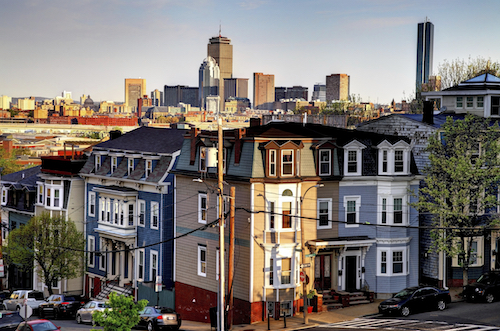Boston city leaders are approving increasing numbers of residential developments with less parking as a way to bolster housing stock and lure new residents, according to a recent report by the Boston Globe.
As the city faces rising housing costs and fewer homes on the market, one idea to spur new development is to ease the longstanding city practice of requiring at least one parking space per unit. Of the 76 residential developments approved by the Boston Planning and Development Agency last year, 30 included less than one space per unit, according to the newspaper.
Many of the developments are aimed at the Millennial demographic, who increasingly want to be in urban centers and do not see a car as a necessity. Pared with Boston’s excellent public transit system and the increasing availability of ride-sharing platforms, city leaders are hoping the new projects will appeal to populations currently priced out of the housing market.
The Millennial affect
One of the main reasons that developers believe less parking spaces are needed is because Millennials are no longer interested in car ownership as part of the American dream, according to a recent report from Goldman Sachs. The report found that while 30 percent of Millennials do not intend to purchase a car in the future, 25 percent are indifferent but might purchase one out of necessity and another 25 percent find car ownership important, but not a big priority. The number of vehicles registered in Boston remains 9 percent below its peak in 2010, according to the Boston Globe.
“The need for 1 to 1 parking is obsolete,” Bruce Percelay, chairman of the Mount Vernon Company, told the Boston Globe. Mount Vernon Company is developing an apartment building in Brighton with more parking for bikes than cars. “Millennials don’t even like to buy cars.”
The easement in parking space regulations will hopefully be a boon to Boston-area Millennials. Boston has the twelfth highest percentage of Millennials stuck at home, with 35 percent of young people still living with their parents, according to a recent study. This comes despite the Boston area having the most highly educated population of Millennials living at home. Boston has the second-lowest Millennial unemployment rate of the top-12 cities, and has the highest average income of Millennials living at home. But young people in the area are facing the second-highest median rent of the top 12 cities, behind only Los Angeles, the study found.
Keeping costs down
Not only does Boston have a problem with soaring real estate prices, it is also dealing with record low inventory. Single-family home sales have dropped from 16,951 in January 2016 to 11,259 in 2017. This 33.6 percent drop marks the lowest inventory of single-family homes in the last 12 years, according to Paul Yorkis, president of the Massachusetts Association of Realtors. This decrease marks the 59th time in the last 60 months of year-over-year inventory decreases for single-family homes.
January’s median price of a single family home in Massachusetts reached $342,500, marking the highest median sales price in over a decade.
With these new developments, Boston is hoping to tackle both problems at the same time.
Fewer parking spaces generally means a less expensive development project, with each underground parking space costing about $50,000, according to the Globe. As it turns out, the parking space requirement is cost prohibitive enough that developments could not be feasible without a variance on the law, the paper reported.
The thought is the savings will be passed on to the buyer in the form of more affordable housing.
Neighborhood concern
However, this cutback is facing a backlash in parts of town where the coveted free parking spaces are being threatened by lack of on-site parking for apartments and condos.
“As you get into neighborhoods where on-street parking is challenging, there’s a real desire on the part of neighborhoods to assure that you have what they deem to be adequate parking on-site,” Jay Doherty, chief executive at Cabot & Forbes said. “That’s a lot closer to one space per unit.”
Some Boston civic leaders have looked elsewhere for ideas to remedy the issue, including Chicago, where a new development that will offer no parking has broken ground near a train station. Residents are required to sign an agreement saying they won’t apply for permit parking on nearby residential streets, limiting the development’s effect on nearby neighbors.
Building more Hubway bike stations, more Zipcar parking and shuttle service could also help keeps cars off side streets and make parking-space-free units more attractive to potential buyers.

